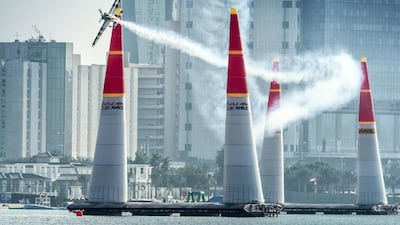ABU DHABI // The aircraft may be state-of-the-art, but it is cutting-edge technology on the ground that helps make the annual Red Bull Air Race World Championship a reality.
Described as the fastest motorsport in the world, the jets used in the race can reach speeds of up to 370kph, inducing gravitational forces that push the human body to its limits.
Given such high speeds, the brains behind the race have had to devise a cutting-edge timing system.
When the Red Bull Air Race begins in the capital next week, competitors will be racing against the clock as they navigate an aerial obstacle course in the fastest possible time.
Pilots fly individually and have to complete tight turns through a slalom course consisting of 25-metre-high pylons, also known as “air gates”.
As the planes weave in and out of the roughly six-kilometre course, the winning pilot will have clocked the top speed after crossing the finishing line.
But in the world’s fastest race, fractions of a second determine who wins or loses.
Take last year’s race in Abu Dhabi for example – only six tenths of a second separated winner Paul Bonhomme of Britain and Canada’s Pete McLeod, who placed third.
With such slim margins, Jim DiMatteo, the event’s director, said organisers had adopted some of the most sophisticated timing technology available.
“Our system is one of the world’s most precise in the sports universe,” he said.
“Using 10,000-frames-per-second photo finish state-of-the-art technology, we go up 10 thousands of a second precision.”
Put simply, race officials can distinguish a difference of as little as 10cm between planes after they have completed the course.
Official timekeeping for the race is done by Breitling, with technical support by Alge Timing, an Austrian company specialising in sports.
Timing is handled by a race committee, race director, head judge, aviation director and sports technical manager.
In case the timing equipment fails, the race has five additional timing systems. They include cameras, aircraft-mounted transponders, laser scanners, a manual backup, and a new system being enacted this year with one-thousandth of a second precision.
Fourteen pilots from 11 countries are expected to compete against one another using some of fastest, lightest, and most agile one-seater jets on the market, capable of climbing at speeds of up to 1,300 metres a minute and rolling at a nausea-inducing 420 degrees a second.
On the course, the “air gates” that the pilots fly through might seem like giant inflatable balloons but, again, race organisers thought hard about safety.
Made of ultralight fabric, the air gates are designed to burst safely should a pilot clip one with the wings of their aircraft.
The inevitable repair jobs can be completed in as quick as a minute and a half by a team of technicians known as the Red Bull “Airgators”. That means minimal delays in the action.
Tickets for the event, which takes place on Abu Dhabi’s Corniche from February 13 to 14, are now available.
Exclusive tickets begin at Dh600, while general admission to a dedicated Red Bull zone on the Corniche is free.
Tickets are available at Virgin Megastores in Abu Dhabi Mall, Al Wahda Mall and Yas Mall in Abu Dhabi, and at BurJuman mall, City Centre Deira, Dubai Mall, Mall of the Emirates, Mercato Shopping Mall and Mirdif City Centre mall in Dubai, and online at tickets.virginmegastore.me.
esamoglou@thenational.ae

